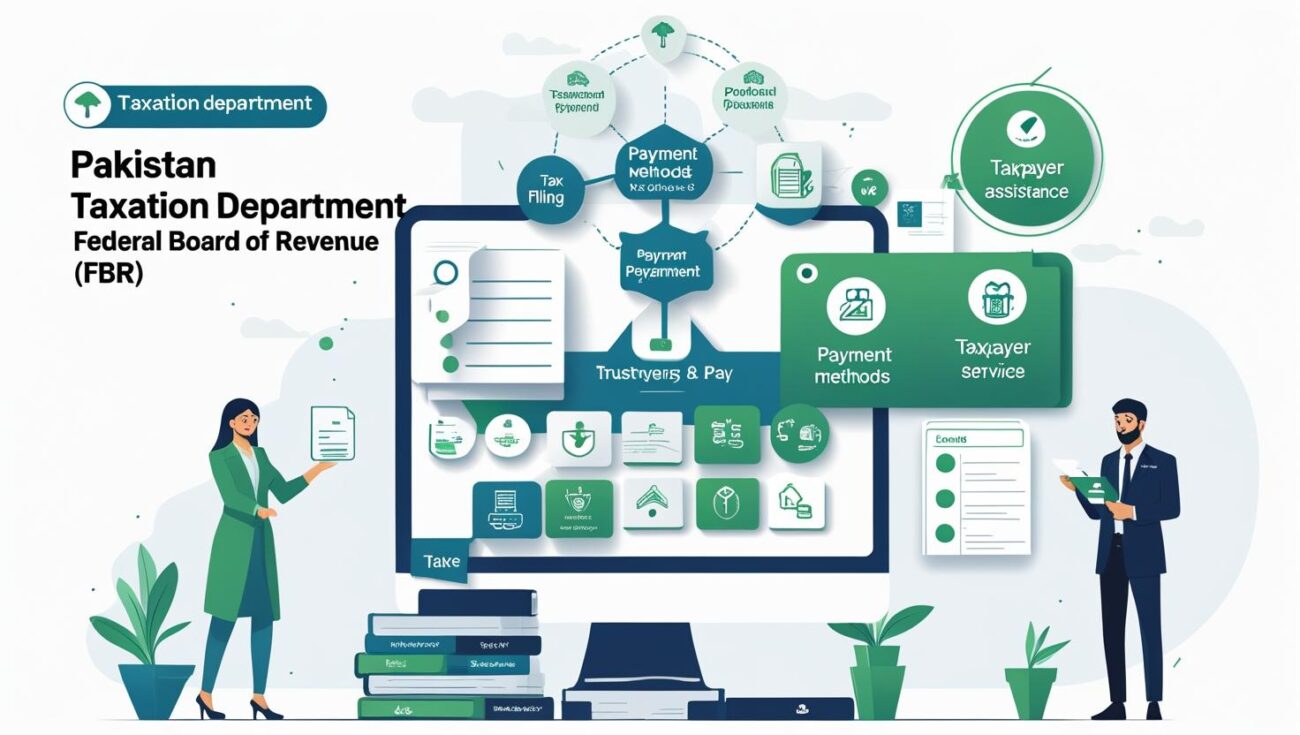Taxation laws in Pakistan are undergoing a historic transformation. Economic structural adjustments, digital development and international commitments have made the national tax structure wider, stricter and more intricate. Whether you are a private taxpayer, a business owner or an offshore investor, knowing what you are up against is key if you are to make informed decisions.
Finance Act 2025 Tax Culture Revolution The introduction of Finance Act 2025 brought a radical change in the methods of tax collection and payment system in Pakistan. It illuminated not only higher levels of money creation but also formalization of sectors that have long lurked in the shadows of the informal economy — notably, digital commerce and real estate. In this blog, we are going to delve into the in depth details about structure, recent reforms, enforcement mechanism and practical implications of Pakistan taxation laws.
Legal Structure and Authority
The Federal Board of Revenue (FBR) is the supreme government organization of Pakistan, responsible for the collection of revenue while playing the role of policymaker of Government of Pakistan. Controlled by the Income Tax Ordinance 2001 and the Sales Tax Act 1990, the FBR administers federal income tax, sales tax, customs duties, and federal excise. Revenue authorities manage taxes like services sales tax under their laws in the meanwhile.
There has been increasing synchronization between federal and provincial systems also particularly in services taxation in recent years. More importantly, the move towards a documentation-based, harmonised system reflects its desire to increase tax compliance and broaden the tax base.
Major Reforms Proposed by Finance Act, 2025
The introduction of the Finance Act 2025 marked a significant milestone in taxation laws in Pakistan. With effect from 1 July 2025, this law made fundamental amendments to income tax, sales tax, withholding tax and rules related to digital economy.
Revised Personal Income Tax Brackets
The government also adjusted the personal income tax brackets for a fairer distribution of the tax burden. With earners falling in the up-to-PKR 600,000 bracket, i.e., lowest income group, being disallowed from availing any waiver as they already avail zero excess to others falling in the 11-35% tax rates. These changes are intended to reduce inequality and claw back more cash from the richer parts of society.
Capital Gains and Interest Income Reforms for Investors
There were also various new provisions for businesses and investors relating to the taxation of capital gains and interest income. Nonresident Investors now to pay more capital gains tax on short-term investments in G-securities. Additionally, the rate for interest income was hiked for non-individual entities so that companies are not able to avoid tax via corporate structuring.

Taxation of the Digital Economy
Under the Finance Act 2025, the digital economy takes a new spotlight through new taxation laws in Pakistan. From now on, online vendors, marketplaces, intermediaries of payment and logistics services themselves are confronted with a broad array of tax obligations, being faced with compulsory registration in addition to monthly reporting. New tax of digital presence has been imposed on foreign companies that are doing business in Pakistan without having physical existence. This goes for digital advertisers, software providers and online traders worldwide.
Property Tax Reforms and Capital Gain Exemptions
Property tax is a proposed-reform area too. Sale Purchases of Immovable Properties have been updated to market taxes withheld. Now property held, used personally and lived in for 15 years or more can be exempt from the capital gain tax, subject to fulfilment of certain compliance conditions. Its objective is to promote transparency in the property market and reduce speculative practices.
Sales Tax Reform through Negative-List Approach
Sales tax also changed significantly. The decision to adopt negative-list system at the provincial level implies that all services are now taxed except those which are specifically exempt. This approach streamlines administration and minimises uncertainty regarding the interpretation of tax. Previously un-taxed services such as commercial renting (in many countries), now fall within taxable net leading to widening of tax net.
Strengthening Compliance and Enforcement
The new taxation laws in Pakistan has been laid supported by FBR empowered force of compliance. With the new laws, tax officials are given new authority to mine bank data — and to conduct more intrusive audits, such as posting officers on the premises of a business to monitor operations, more aggressively. In particular, section 175AA of the Income Tax Ordinance makes room for live connectivity and exchange of information between the institutions.
Restrictions on Non-Documented Transactions
For compulsion, non-documented transactions over PKR 200,000 can be disallowed for sake of calculating income on which tax is applicable. Likewise purchase and sale with the suppliers who does not have NTN, can also cause disallowance only to the extent of the supplier not having the NTN No. It is intended that these measures will force commercial entities to do business with registered persons and through proper banking.
Penalties for Non-Filers and Higher Withholding
Non-filers also face steeper consequences. A higher rate of withholding tax applies to those who are not registered as active taxpayers. The cash withdrawal tax rate of non-filers from banks has gone up and so have the advanced tax rates on property deals, purchase of vehicles. This balance of rewards and penalties reinforces the value of adhering to regulations.

Policy Objectives and Economic Impact
The central focus of such dramatic reforms is to articulate a policy agenda, which is to raise the tax-to-GDP ratio, to document the economy and to implement commitments made to international partners, including the IMF. Pakistan has long grappled with a narrow tax base, and high levels of tax evasion. These problems are directly targeted through present taxation laws in Pakistan.
Ambitious Tax Targets and Agriculture Reforms
Govt sets ambitious tax collection target of over Rs14tr for FY 2025–26. There have been reforms in agriculture taxation — an area which was undertaxed — to ensure larger equity. The commonality between governments, especially in the treatment of corporate tax rates on farm income and other related adjustments, can be seen nationwide.
Integrating the Digital Economy into the Tax Net
Digital commerce, which has surged in recent years, is now solidly on the tax radar. By making registration compulsory, introducing withholding obligations and facilitating digital tax collection, the government is hoping to bring a sector that was largely unregulated into its revenue net.
Tax Adjustments Impacting Real Estate and Financial Markets
Real estate and financial markets have taken a hit as well. Today, realtors, developers, and institutional investors face challenging withholding nuances, compliance obligations and elevated doc burden, such as. The banking sector is not immune, with adjustments in the taxation of interest and dividends.
Compliance in Practice
The neworder is a more complex scheme for taxpayers, requiring a greater amount of due diligence and transparency. There is no opting out of filing income tax returns for those involved in real economic activity. The penalties for non-compliance are serious – ranging from fines, disallowances of expenses, up to the bad cases up to criminal prosecution.
The businesses also need to keep full records, suppliers need to register, and there can be no cash transactions beyond set amounts. For members of the digital economy, compliance with new rules involve understanding intermediary obligations, electronic invoicing, and monthly filing for taxation purposes.
For real estate buyers and sellers, we recommend that you meet with tax professionals who can fully explain the impact of capital gains, the withholding rate and exemptions. In the meantime, high-net-worth individuals need to continue to monitor changes to wealth reporting and surcharge thresholds.
Looking Ahead
Given the pace of development in the area of taxation laws in Pakistan, that is not likely to be the last word on the subject. The measures now put forth are a big step forward, but there could always be more provisions adopted in subsequent finance bills. The changing economy calls for tax policy to evolve with it, becoming more digitized and globalized.
The FBR has expressed its plans to enhance the utilization of AI (artificial intelligence) and data analytics in enforcement, which will pursue tax fraud and search for non-filers. In addition, continuing discussions with international tax authorities could lead to stricter oversight over cross-border income and foreign-held assets.
Conclusion
The recent taxation laws in Pakistan seem part of the concerted effort by policy-makers to broaden the tax base, enhance compliance and match international norms. The government is working towards a more transparent, fair, and efficient tax system through income tax, sales tax and digital economy taxation as well as enforcement reforms.
The repercussions for people and companies are significant. “Surviving in this environment takes more than just holding on-but also strategic planning and sound financial decisions. Whether you are a wage earner, entrepreneur, investor or a digital content creator, being cognisant of your tax liability is central to remaining compliant and avoiding costly fines.
If you are not sure how the changes may affect you, perhaps it is time to seek advice from a true professional in taxes. In today’s environment of heightened control and compliance, the best defence is represented by being informed and involved in how you deal with your obligations under the taxation laws in Pakistan.


